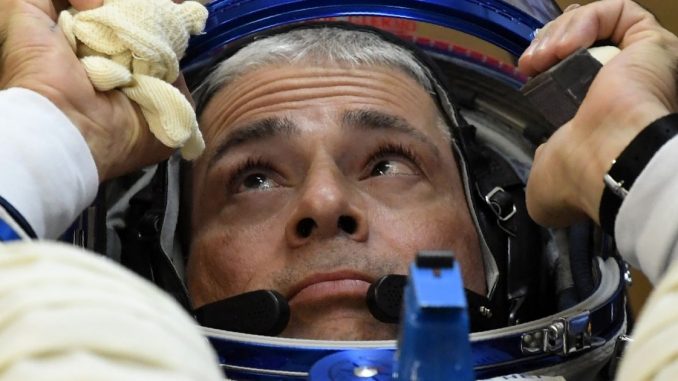
An American astronaut aboard the International Space Station has become a political pawn in Russia’s game of angry words directed at the United States.
The ISS has included Russian cosmonauts and American astronauts since its beginning in 1998. Since 2011, when the U.S. ended its space shuttle program, the U.S. has paid Russia to ferry astronauts into space and back home again, amid good times and tense times.
But some angry words being thrown around mean that could all be changing, according to WABC-TV.
In early March, Dmitry Rogozin, the head of Russia’s Space Agency, posted a Twitter video that appeared to threaten the taxi service could end due to sanctions imposed on Russia over its invasion of Ukraine.
That would mean that American astronaut Mark Vande Hei, the record holder for the longest time in space, would not come home as his time ends in a few weeks.
The game plan has been for Vande Hei to land in Kazakhstan with two cosmonauts.
The website LiveScience has said Rogozin’s comment was made as a joke, but it has been no laughing matter for former astronaut Scott Kelly, who has been outspoken in his anger that the words were being tossed around.
“It kind of enraged me that the country that we had been in this international partnership for 20 years would take the time to make a video to threaten to leave behind one of the crew members they are responsible for,” Kelly said, according to Newsmax. “They agreed to be responsible for his safety, getting him to the space station and getting him home. For me, that kind of just crossed the line.”
Kelly’s anger drew return fire from Rogozin.
“You are being defiant and destructive,” Rogozin tweeted to Kelly, according to CBS, using a Google translation.
“Perhaps the dementia and aggression that you have developed is a consequence of the overload and stress of four flights into space. I invite you to undergo an examination at the Brain Institute of our Federal Medical and Biological Agency.”
One tweet Rogozin deleted said “Get off, you moron! Otherwise, the death of the #ISS will be on your conscience,” according to CBS.
Kelly said Rogozin has “always been a clown,” as shown by his comments.
“It’s just a lot of people didn’t realize it, because they never gave him much attention. But you know, this highlights how big of a clown he really is,” Kelly said.
Although the immediate threat of leaving Vande Hei in space might have been rhetorical, Kelly said NASA should be – and undoubtedly is – preparing for the way when conflicts on Earth end the partnership in space.
“If the Russians decide that they’re going to walk away from it or do whatever, it would be hard for NASA to go it alone,” he told CBS. “But you know, what? That’s what NASA does, they do hard things. So I think they’d figure out how we could do attitude control (or) how we could boost the space station. … It’s not impossible to go without the Russians. It’d be hard but, you know, that’s what NASA does. Hard stuff.”
“I think it would send a good message to the Russians that if they want to get out of this partnership, then we can do it ourselves. We don’t really need them. We did a few years ago, but not anymore, right?” he said, suggesting that SpaceX Crew Dragon capsules and, in time, Boeing’s Starliner can fill the gap a loss of Russian rockets would represent.
“I have a lot of Russian friends. And you know, some of them are completely in line with our thinking on this, and some of them aren’t. And the ones that aren’t, it’s not because they are stupid or have bad intentions,” Kelly said.
“It’s just because they’ve been fed misinformation for years and now are continuing to get propaganda and have limited access now to other sources of valid information on what’s going on,” he said.
Kelly, the twin brother of Arizona’s Democratic Sen. Mark Kelly, said he hopes the partnership survives.
“I just hope people realize and want to keep this partnership together because it is one of the few things that unites all of humanity together,” said Kelly. “I think one of the biggest successes of the International Space Station is the international aspect of giving us something to work on together, that makes us friends.”
